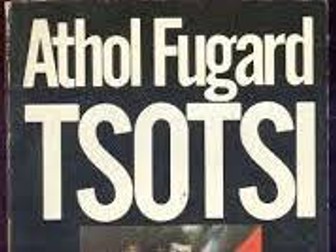Tsotsi Athol Fugard
Athol Fugard
Athol Fugard is a South African playwright, novelist, and director, who often writes on the subject of South African apartheid. His works are often critical investigations of South African history, and he has been called South Africa's greatest playwright. His plays include The Cell, The Blood Knot, Hello and Goodbye, Boesman and Lena, Sizwe Bansi is Dead, The Road to Mecca, My Children! My Africa!, Sorrows and Rejoicings, The Shadow and the Hummingbird, and others. He is also known for writing the novel, Tsotsi, which was then turned into an Academy-Award winning film.
“Tsotsi” is the Afrikaans word for young thugs who rule the township streets of South Africa. This is the “name” of Athol Fugard’s young protagonist. He is mysterious, shadowy, has no name; has no past, family, or friends, or at least no recollections of every belonging anywhere or to anyone. In 2006, the film Tsotsi, based on Athol Fugard’s 1961 novel, won international awards, including the Oscar for Best Foreign Film. In 2014, Fugard returned to the stage as an actor for the first time in 15 years to act in his new play, Shadow of the Hummingbird, at the Long Wharf.

After dropping out of university, Fugard spent some time working on a steamer ship in North Africa, before moving to Johannesburg, where he worked as a clerk in a Native Commissioners' Court. There he began to become interested in the fallout of South African apartheid, and the injustices still built into the system. He began writing plays, many of which were critical of South African politics, and had them produced and published outside the country to avoid censorship. In 1958, he organized a multiracial theater with which he staged his plays. He later formed the Serpent Players.
Tsotsi Athol Fugard Book Summary
John Kani

Bonisile John Kani is a South African actor, director, and writer who collaborated with Fugard to create The Island. His first collaboration with Fugard was on the anti-apartheid play Sizwe Banzi is Dead. He won a Tony Award for his work on the play, which transferred to Broadway in 1975.
As a playwright, his plays include Nothing but the Truth, which looks at the conflict between South African Blacks who stayed to fight apartheid and those who left. His collaborations with Fugard and Winston Ntshona include Sizwe Banzi is Dead, The Island, and Statements After an Arrest Under the Immorality Act.
As an actor, Kani has worked on numerous plays, television shows, and films, including Miss Julie(a television film), Othello (a television film), Wallander, The Ghost and the Darkness, Endgame, Coriolanus, Captain America: Civil War, Black Panther, and The Lion King.
Winston Ntshona
Winston Ntshona was Fugard's other collaborator on The Island. He also won a Tony, along with John Kani, for his work on Sizwe Banzi is Dead. As an actor he appeared in the filmsThe Wild Geese, Marigolds in August, Gandhi, A Dry White Season, The Power of One, Tarzan and the Lost City, and Blood Diamond. He died in 2018.
Tsotsi Athol Fugard Book Review
“Tsotsi is a real find, by one of the most affecting and moving writers of our time” (Financial Times)–and the novel is now being reissued to coincide with the release of a feature film, which is already being compared to 2004’s runaway hit City of God
One of the world’s preeminent playwrights “who could be a primary candidate for either the Nobel Prize in Literature or the Nobel Peace Prize” (Mel Gussow, The New Yorker), Athol Fugard is renowned for his relentless explorations of personal and political survival in apartheid South Africa–which include his now classic plays Master Harold . . . and the Boys and The Blood Knot. Fugard has written a single novel, Tsotsi, which director Gavin Hood has made into a feature film that The Times (London) calls “a remarkable achievement” and is South Africa’s official entry for the 2006 Academy Awards.
Tsotsi Athol Fugard Summary
Set amid the sprawling Johannesburg township of Soweto, where survival is the primary objective, Tsotsi traces six days in the life of a ruthless young gang leader. When we meet Tsotsi, he is a man without a name (tsotsi is Afrikaans for “hoodlum”) who has repressed his past and now exists only to stage and execute vicious crimes. When he inadvertently kidnaps a baby, Tsotsi is confronted with memories of his own painful childhood, and this angry young man begins to rediscover his own humanity, dignity, and capacity to love.